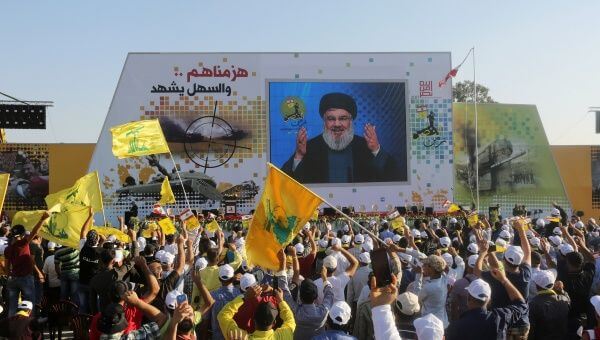The Israeli government faces another potential confrontation on its northern border with a far more powerful adversary: the Lebanese Hezbollah. This is happening as Hamas shoots missiles and rockets from its stronghold in Gaza and its fighters terrorize Israel. The Lebanese group launched artillery and missiles into the Israeli-controlled Golan Heights on Sunday, the day after Hamas attacked Israel on Saturday (07.10.2023), as a display of “solidarity,” and Israel retaliated by attacking a Hezbollah base in Lebanon.
The Lebanese Hezbollah, an opponent much stronger than the Israeli government, stands in the way of another potential conflict on Israel’s northern border. This is taking place as Hamas terrorizes Israel from its base in Gaza by firing rockets and missiles. The day after Hamas attacked Israel, the Lebanese group sent artillery and missiles into the Israeli-controlled Golan Heights on Sunday as a show of “solidarity,” and Israel responded by hitting a Hezbollah camp in Lebanon.
Israel’s past engagement with Hezbollah
If Hezbollah launched more than a handful of missiles in support, the ongoing conflict—which is already the worst for Israel since the Second Intifada—would intensify. Since the organization’s founding in the early 1980s, Hezbollah has proven to be Israel’s most formidable adversary. Initially, Hezbollah battled to drive Israel out of Lebanon, and it was successful in 2000.

When Hezbollah engaged in a 34-day war with Israel in 2006, the entire world got a taste of what it was capable of. Hezbollah engaged in brutal combat while not intending to start a full-scale war when it launched a successful cross-border incursion that year that resulted in the deaths of eight Israeli troops and the detention of two more. Israel lost at least 157 soldiers in the fight as a result of military operations and Hezbollah rockets, which continued to rain down on Israel throughout the conflict despite air and ground operations meant to put an end to the fire.
Hezbollah suffered significantly greater casualties, but it declared the war a success, and Israelis concurred. Nearly two-thirds of Israelis believed that their prime minister should resign after the conflict.
The next dispute can turn out to be far worse. Iran provides the group with training and hundreds of millions of cash annually. Hezbollah has significantly increased its arsenal and currently possesses even more rockets and missiles than in 2006, thanks to significant Iranian assistance. Israel can be deeply struck by these. A variety of surface-to-air missiles and anti-ship cruise missiles that Hezbollah has acquired would hamper any operations by Israel. Even Hezbollah’s cyber capabilities were aided by Iran.
Hamas-Hesbullah combined attack might be devastating for Israel
Compared to Hamas, whose current operations are already a nightmare for Israel, Hezbollah is much more powerful. Hamas is restricted to a small area in Gaza, and its armed forces have not had much success fighting Israel.
Hezbollah has control over a sizable portion of the Beqaa Valley and southern Lebanon. Additionally, Hezbollah holds seats in the Lebanese parliament. In recent years, Hezbollah has exercised a de facto veto on government policy in Lebanon by directly controlling a number of ministries and working with allies to control others. Furthermore, despite Iran’s support for both organizations, Hezbollah has received much more favor.

Additionally, Hezbollah is more skilled than other militant organizations—possibly the world’s most skilled. Hezbollah fighters have fought in the Syrian civil war virtually continuously since it began in 2011, in addition to battling Israel in 2006, serving as a stabilizing force for the shaky regime of Syrian President Bashar al-Assad. Patrolling the Lebanon-Syria border, battling Sunni rebels in multiple Syrian cities, and attacking Islamic State sites with drones were among the missions.
Hezbollah’s motives?
Hezbollah has always supported Hamas. This has always been crucial to the development of the organization. It has tried to inculcate its knowledge and ideology through training and indoctrinating Hamas fighters in Lebanon. Hezbollah supported the Palestinians for a long time and provided food and support wherever they could.
Hezbollah considers itself to be an example for Hamas. Hassan Nasrallah, the leader of Hezbollah, made a famous speech in which he compared Israel to a “spider web,” asserting that while it appeared strong from a distance, it lacked strength because its people were unwilling to make sacrifices. As a result, Nasrallah said, you can simply brush it aside.
So if we talk about Hezbollah’s motives in this conflict, they, too, like Hamas, simply want to free Palestine. To free the people of Palestine from the oppression that they have endured for so many years. To give the people of Palestine their rightful land back.